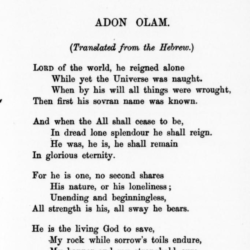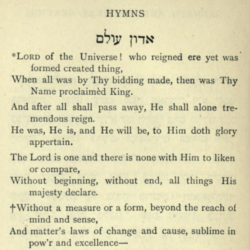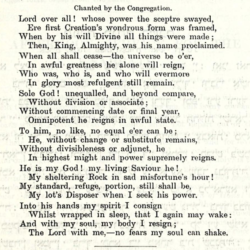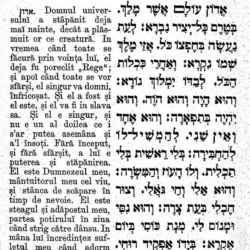Contributor(s): Shared on: Categories: Tags: | Source (Hebrew) | Translation (English) |
|---|
אֲדוֹן עוֹלָם אֲשֶׁר מָלַךְ
בְּטֶֽרֶם כׇּל־יְצִיר נִבְרָא׃
לְעֵת נַֽעֲשָׂה כְּחֶפְצוֹ כֹּל
אֲזַי מֶֽלֶךְ שְׁמוֹ נִקְרָא׃ |
The everlasting Lord who reigned
Ere yet was formed or shape or thing,
When all was made as he decreed
Was even then acknowledged King. |
וְאַֽחֲרֵי כִּכְלּוֹת הַכֹּל
לְבַדּוֹ יִמְלֹךְ נוֹרָא׃
וְהוּא הָיָה וְהוּא הֹוֶה
וְהוּא יִֽהְיֶה בְּתִפְאֲרָה׃ |
And after all that is shall end,
Alone shall reign the feared one — He
In his resplendence glorious
Who was, who is, and who will be. |
וְהוּא אֶחָד וְאֵין שֵׁנִי
לְהַמְשִׁיל לוֹ לְהַחְבִּירָה׃
בְּלִי רֵאשִׁית בְּלִי תַּכְלִית
וְלוֹ הָעֹז וְהַמִּשְׂרָה׃ |
And He is one and there is none,
No second to compare or share —
Without beginning, without end —
In his dominion everywhere. |
וְהוּא אֵלִי וְחַי גּֽוֹאֲלִי
וְצוּר חֶבְלִי בְּיוֹם צָרָה׃
וְהוּא נִסִּי וּמָנוֹס לִי
מְנָת כּוֹסִי בְּיוֹם אֶקְרָא׃ |
He is my God — my helper lives —
My rock when grievous times befall,
My banner He, my refuge He,
And my cup’s portion, when I call. |
בְּיָדוֹ אַפְקִיד רוּחִי
בְּעֵת אִישַׁן וְאָעִֽירָה׃
וְעִם רוּחִי גְּוִיָּתִי
אֲדֹנָי לִי וְלֹא אִירָא׃ |
Within His hand I trust my soul
In sleep and waking — He is near —
And with my soul, my body, too:
The Lord’s with me; I have no fear. |
Adon Olam is a piyyut that became popular in the 15th century and is often attributed to Solomon ibn Gabirol (1021–1058) and less often to Sherira Gaon (900-1001), or his son, Hai ben Sherira Gaon (939-1038). The variation of the piyyut appearing here is the 10 line version familiar to Ashkenazi congregations. (There are also twelve, fifteen, and sixteen line variants found in Sepharadi siddurim.) The rhyming translation here by Jessie Ethel Sampter was transcribed from Joseph Friedlander and George Alexander Kohut’s The standard book of Jewish verse (1917), p. 394. Source(s)
 Jessie Sampter (March 22, 1883 – 1938) was a Jewish educator, poet, and Zionist pioneer. Born in New York City to Rudolph Sampter, a New York attorney, and Virginia Kohlberg Sampter, she contracted polio at thirteen which prevented her from leaving home. Unable to attend school her family hired tutors. Later she audited courses at Columbia University. In her twenties she joined the Unitarian Church and began writing poetry. Her poems and short stories emphasized her primary concerns: pacifism, Zionism, and social justice. Around this time, she began spending time in the home of Henrietta Szold and began to appreciate the Eastern European Jews of New York City. She moved into a settlement house on the Lower East Side, then to a Young Women's Hebrew Association. Assuming the role of Hadassah's leading educator, she produced manuals and textbooks and organized lectures and classes, training speakers and leaders for both Hadassah and other Zionist organizations like the Federation of American Zionists (then the Zionist Organization of America). She composed educational manuals with Alice Seligsberg and edited a textbook on Zionism. In 1919 she settled in Palestine where she helped organize the country's first Jewish Scout camp. Sampter developed a strong commitment to assisting Yemenite Jews, founding classes and clubs especially for Yemenite girls and women. She adopted a Yemenite orphan. At the time of her death she had established a vegetarian convalescent home at Kibbutz Givat Brenner. Solomon ibn Gabirol (also Solomon ben Judah; Hebrew: שלמה בן יהודה אבן גבירול Shlomo ben Yehuda ibn Gabirol, Arabic: أبو أيوب سليمان بن يحيى بن جبيرول Abu Ayyub Sulayman bin Yahya bin Jabirul, Latin: Avicebron or Avencebrol) was an 11th-century Andalusian poet and Jewish philosopher. He published over a hundred poems, as well as works of biblical exegesis, philosophy, ethics, and satire. Aharon Varady (M.A.J.Ed./JTSA Davidson) is a volunteer transcriber for the Open Siddur Project. If you find any mistakes in his transcriptions, please let him know. Shgiyot mi yavin; Ministarot naqeni שְׁגִיאוֹת מִי־יָבִין; מִנִּסְתָּרוֹת נַקֵּנִי "Who can know all one's flaws? From hidden errors, correct me" (Psalms 19:13). If you'd like to directly support his work, please consider donating via his Patreon account. (Varady also translates prayers and contributes his own original work besides serving as the primary shammes of the Open Siddur Project and its website, opensiddur.org.) Read a comment / Leave a comment (moderated) Works of related interest: |











Leave a Reply